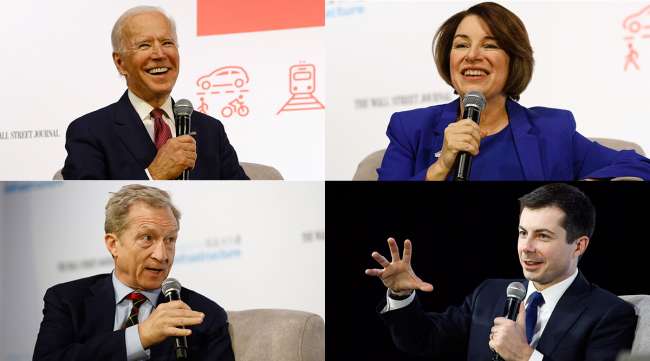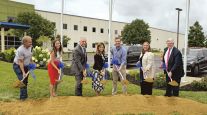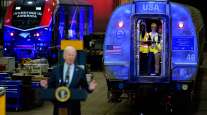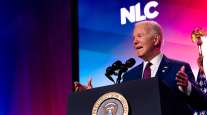Staff Reporter
Presidential Hopefuls Talk Infrastructure at Forum

[Stay on top of transportation news: Get TTNews in your inbox.]
Four presidential candidates emphasized the need to repair existing infrastructure and construct systems that meet future needs at a public forum in Las Vegas.
United for Infrastructure, a nonpartisan institution that focuses on educating the public and policymakers on infrastructure issues, held the Moving America Forward forum Feb. 16. The group organizes Infrastructure Week every year.
All candidates and President Donald Trump were invited to the event, according to Zach Schafer, executive director of United for Infrastructure. Infrastructure is a topic that has been largely absent from presidential debates. Joe Biden, Tom Steyer, Sen. Amy Klobuchar (D-Minn.) and Pete Buttigieg participated in the forum.
Compare each of the presidential candidates' plans for addressing America's infrastructure needs. See our Candidate Infrastructure Tracker.
The moderators, Wall Street Journal Executive Washington Editor Gerald Seib and WSJ Washington Deputy Bureau Chief Jeanne Cummings, spoke with the candidates in individual interviews before a live audience at the University of Nevada that lasted 20-25 minutes each.
Although each candidate agreed with the need to prioritize repairing and developing infrastructure, none explicitly supported raising the federal fuel tax. The federal fuel tax, which supports the Highway Trust Fund, has stagnated at 24.4 cents a gallon for diesel and 18.4 cents a gallon for gasoline since 1993.
Biden’s plan would be supported in part by reversing Trump administration tax cuts on corporations. According to Klobuchar’s plan, infrastructure proposals would be paid for by a series of corporate tax reforms. Steyer described raising the fuel tax as a “super politically sensitive thing.” However, he said expressed interest in raising taxes on certain consumers or businesses.
“My goal is not to do a regressive consumer tax,” Steyer said. “We have a regressive tax system.”
WATCH: "We are poisoning black and brown communities at a completely different level than everybody else."
- @TomSteyer #MovingAmericaForward pic.twitter.com/6scN8iHe9K — United For Infrastructure (@United4Infra) February 16, 2020
Buttigieg’s “Building for the 21st Century” plan proposes a usage charge system, such as a vehicle-miles-traveled fee. The plan identifies this system as a potential replacement for the fuel tax. Buttigieg said a VMT system could be viable, so long as lawmakers quell privacy concerns.
WATCH: "We have to decide whether we think it is ok for the greatest country in the world to have inferior transportation when it comes to rail. It just doesn't make sense." -@PeteButtigieg #MovingAmericaForward pic.twitter.com/VeakOJHwxM — United For Infrastructure (@United4Infra) February 17, 2020
“I think something that links to vehicle miles traveled is attractive only if we can answer some of the Big Brother dimensions of what it means to actually assess a vehicle miles traveled,” Buttigieg said. “We’re already in a society where we’ve got way too much of our personal data being tracked in way too many ways, so we’ve got to be smart about it. I do think we can come together and find a solution.”
The candidates expressed openness to streamlining the permitting process, which has been one aim of the Trump administration. If Biden was elected president, he said he would have an employee in the White House whose sole responsibility was to streamline projects. He also said this employee would take into account input from environmental experts.
Klobuchar also expressed willingness to streamline regulations while maintaining safety standards. She said her grandfather, a miner, benefited from workplace safety standards.
“I am one that’s always open to looking at rules and regulations to see if you can make them work better,” Klobuchar said. “However, I’m not going to mess around with safety or the environment.”
"I'm a big believer in rail. I love it because it is one way my husband and I can travel where we don't have an argument about directions. I also like it because it is better for the environment and creates good paying union jobs." - @amyklobuchar #MovingAmericaForward pic.twitter.com/eTw8uAX1FW — United For Infrastructure (@United4Infra) February 16, 2020
The nation earned a D+ on the American Society of Civil Engineers’ infrastructure report card, issued in 2017. The group estimates that America faces a $2 trillion funding gap for infrastructure needs. ASCE has determined that, from 2016 to 2025, each household will lose $3,400 each year in disposable income due to infrastructure deficiencies.
Biden described infrastructure as “not a Republican or a Democrat” issue, stressing the need for modern ports, airports, locks and dams to grow American business.
WATCH: @JoeBiden at the #MovingAmericaForward Presidential Forum says we need to "start with fixing broken infrastructure in a modern way." pic.twitter.com/FL9vPpn8RR — United For Infrastructure (@United4Infra) February 16, 2020
Klobuchar said she lives eight blocks from where the Interstate 35W bridge in Minneapolis experienced a deadly collapse in 2007. She noted the people who leapt into action to save lives during that incident, such as the off-duty firefighter who looked for survivors in the Mississippi River and the school bus driver who made sure the kids on the bus reached safety.
“That wasn’t just a bridge. That was an eight-lane highway,” Klobuchar said. “When we think about infrastructure, we have to remember that our public works and our public good is a part of who we are as a nation.”
Nevada's Democratic causes will be held Feb. 22. The general election will be held Nov. 3.
Want more news? Listen to today's daily briefing:




